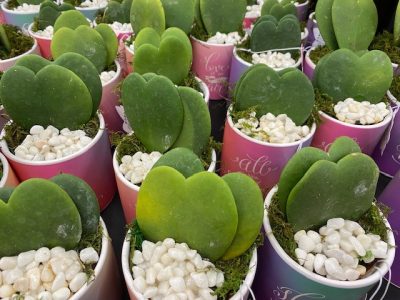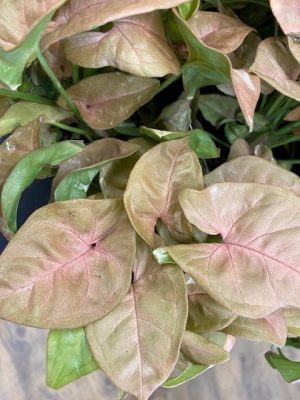Hearts for Valentine’s Day
By Dawn Pettinelli, UConn Home & Garden Education Center
While there’s always the traditional Valentine’s Day gifts of flowers and candy, why not give that special someone a plant with heart-shaped leaves that will likely last much longer than chocolates or bouquets. There are actually a number of plant species to choose from with some being quite easy to grow.
Perhaps the cutest, as well as the easiest is the Sweetheart hoya (Hoya kerrii). Hoyas are a very slow growing, vining plant with stems that may reach 13 feet in length. Typically, it is grown in a wreath form or on a trellis. The pink or white flowers are fragrant but not produced in great abundance.
While this plant has the most adorable heart-shaped leaves, the ones that are sold as a single leaf in a pot will, in most cases, remain as a single leaf. Unless a piece of stem was left attached to the potted leaf, the plant is not able to initiate new leaf or stem formation. This makes for a simple plant to care for, however. Keep your Sweetheart hoya leaf in a bright sunny spot with temperatures in the 60 to 80 degree F range and water when dry.

Another plant for small spaces with charming marbled, heart-shaped leaves is the String of Hearts (Ceropegia woodii). While the dainty individual stems can grow 12 feet long, they can be trimmed to keep the plant compact. The grey-green leaves are small, only about ½ inch in diameter. String of Hearts is a succulent best grown in a potting mix labeled for cacti and set in bright, filtered sunlight. Let plants dry out slightly between waterings. Keep away from drafts and note that plants may go dormant if the temperature falls below 60 F.
Philodendrons (P. hederaceum) have been grown for ages and with good reason. These tough, vining plants with heart-shaped leaves tolerate the lower light levels found in many homes. Stems may grow 3 feet or longer and plants are best suited to a hanging basket or trellis. Exciting newer cultivars such as ‘Brasil’, ‘Cream Splash’ and ‘Rio’ offer variegated leaves. Grow plants in bright, indirect light and avoid overwatering. Trim plants if they overgrow their bounds.
More recently, anthuriums with their flashy colored spathes in red, orange, pinks, and purples have been livening up the holiday plant scene. Both the spathes, which are modified leaves, and the true glossy, green leaves are shaped like hearts. Plants grow to about 16 inches high and if content will produce long-lasting colorful spathes several months of the year. Tiny flowers are on the tail-like spike that emerges from each spathe. Anthuriums also appreciate bright but indirect light, a well-draining, acidic soilless potting media and to be kept moderately moist.
Similar in care to anthuriums, syngoniums have heart-shaped leaves and new varieties come in various shades of pink, purplish red and even variegated cultivars. Syngoniums are evergreen climbers but can be maintained as a shrubby houseplant if trailing stems are removed. As the plant ages, leaves become more arrow-shaped. Plants enjoy warmth and humidity and do best in moderately moist potting mixes and in bright diffused light.

A little harder to find but worth the search is the Heart Fern (Hemionitis arifolia). Like many tropical ferns, it prefers indirect light in a warm, humid location. Plants may reach 10 inches tall and wide. The leaves are dimorphic, with the sterile fronds being heart-shaped and the fertile ones resembling arrowheads. Unlike most ferns, the foliage is thick and leathery. Being an epiphyte, plants should be grown in a light, airy potting mix and kept moist at all times.
Lastly, there are varieties of English ivy (Hedera helix) with heart-shaped leaves. ‘Sweetheart’ and ‘Heart’ are two common cultivars. Blue-green leaves form along stems that can be trimmed to any length. Grow as a hanging basket or in a decorative pot. English ivy enjoys cooler temperatures and bright but diffused light. East or north facing windows are ideal locations.
This year, mix it up a little for Valentine’s Day and give the heart-felt gift of a plant with heart-shaped leaves. Do note that some of the above plants are toxic if consumed so should be kept away from children and pets.
If you have questions about these plants or if you have any other gardening questions, contact the UConn Home & Garden Education at (877) 486-6271 or www.homegarden.cahnr.uconn.edu or your local Cooperative Extension Center.